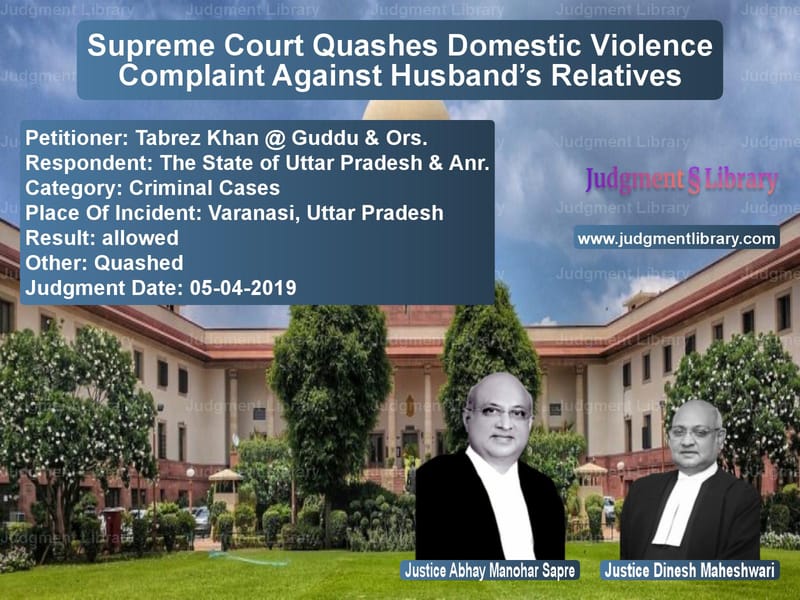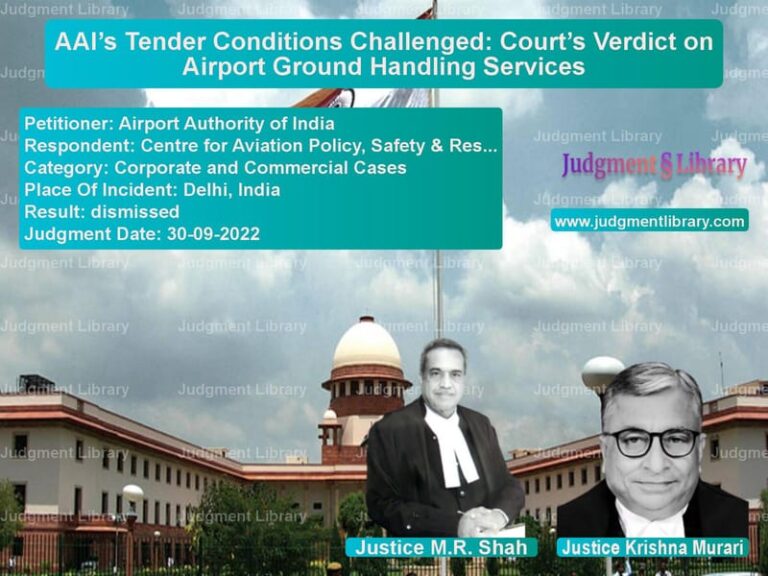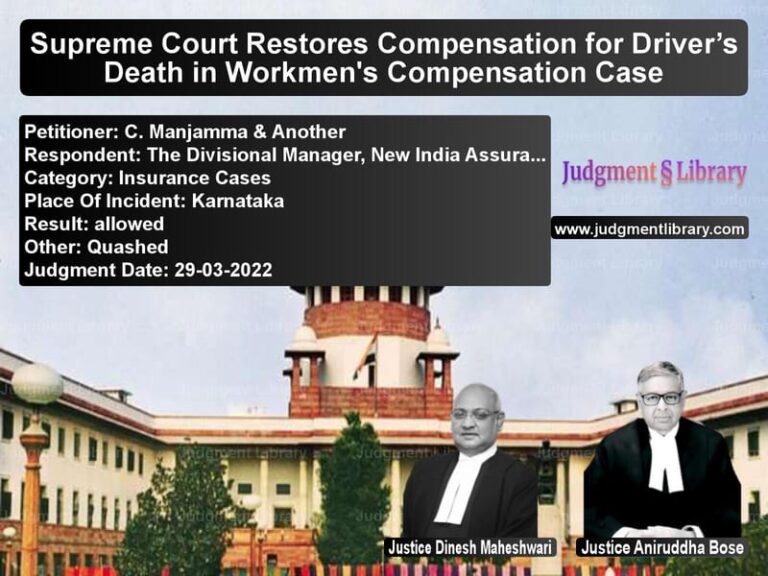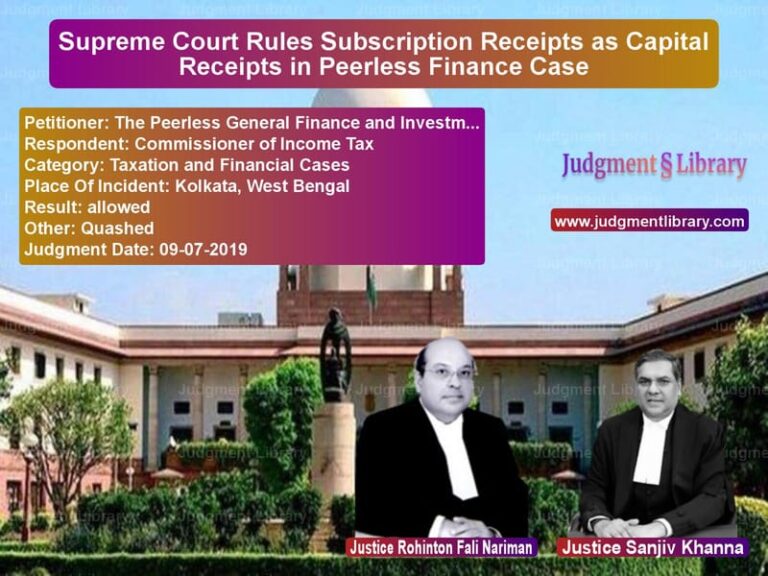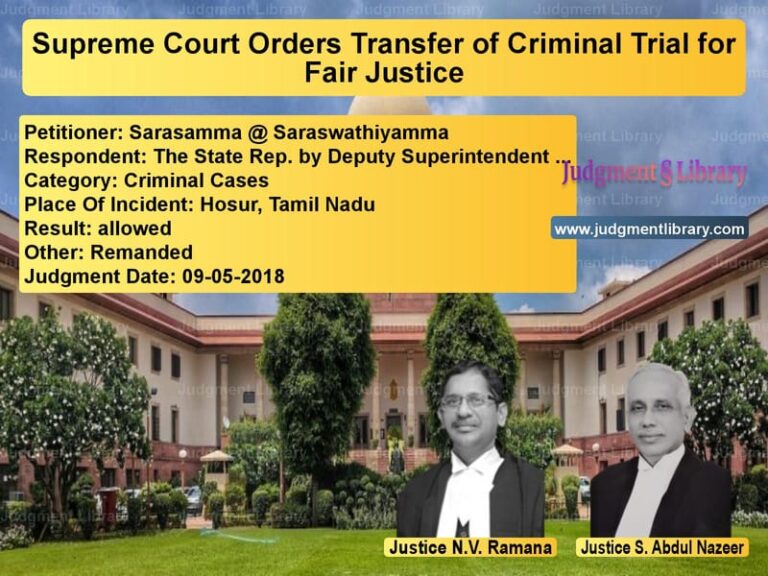Supreme Court Quashes Domestic Violence Complaint Against Husband’s Relatives
The case of Tabrez Khan @ Guddu & Ors. v. The State of Uttar Pradesh & Anr. dealt with a complaint filed under Section 498A IPC and Section 3/4 of the Dowry Prohibition Act, alleging domestic violence and dowry harassment. The Supreme Court quashed the complaint against the appellant (husband’s relatives), ruling that there was no prima facie evidence to justify proceedings against them. However, the case against the husband, Mohammad Pervez Khan, was allowed to proceed.
This judgment clarifies the importance of distinguishing genuine cases of domestic violence from false and exaggerated allegations and upholds the principle that prosecution should not be pursued in the absence of substantial evidence.
Background of the Case
The complainant, the wife of Mohammad Pervez Khan (Respondent No.2), alleged that she was subjected to cruelty and harassment by her husband and his family members, including her mother-in-law and brothers-in-law. She filed a complaint in the Court of Additional Chief Judicial Magistrate (ACJM), Court No.8, Varanasi, under:
- Section 498A IPC (Cruelty by Husband or Relatives of Husband),
- Section 323 IPC (Voluntarily Causing Hurt),
- Section 504 IPC (Intentional Insult with Intent to Provoke Breach of Peace),
- Section 506 IPC (Criminal Intimidation), and
- Section 3/4 of the Dowry Prohibition Act (Demand for Dowry).
The trial court issued summons to the accused, prompting the appellants (husband’s relatives) to file an application under Section 482 of the Code of Criminal Procedure (Cr.P.C.) before the Allahabad High Court, seeking to quash the complaint.
The High Court dismissed the application, ruling that a prima facie case was made out against all accused. Aggrieved by this decision, the appellants approached the Supreme Court.
Key Legal Issues
- Whether the complaint disclosed a prima facie case against the appellants.
- Whether the High Court erred in rejecting the application under Section 482 Cr.P.C.
- Whether the prosecution of the appellants amounted to an abuse of the legal process.
Arguments by the Appellants (Relatives of the Husband)
- The complaint was a general allegation without any specific details of cruelty or harassment.
- There was no independent evidence to support the accusations.
- The case was filed due to personal disputes and exaggerations, which were common in matrimonial disputes.
- The High Court erred in dismissing their plea without properly examining the lack of evidence.
Arguments by the Respondents (State of Uttar Pradesh & Wife)
- The complaint made specific allegations against all the accused, which warranted a full trial.
- The magistrate had properly issued summons after considering the evidence.
- It was not appropriate to quash the complaint at the preliminary stage.
Supreme Court’s Observations and Judgment
The Supreme Court examined the legal principles governing the quashing of complaints under Section 482 Cr.P.C. and emphasized that criminal proceedings should not be initiated without substantial evidence.
Key observations:
- The allegations against the appellants were vague and lacked specific details.
- There was no independent witness testimony supporting the claims.
- Courts should be cautious in allowing family disputes to escalate into criminal cases without proper justification.
- The High Court had failed to scrutinize the evidence properly before dismissing the appellants’ application.
Key Judgment Excerpt:
“In our view, there does not appear to be any justification or prima facie case to proceed against the appellants either jointly or severally for the commission of the offenses alleged against them in the complaint.”
The Supreme Court quashed the complaint against the appellant relatives but clarified that the case against the husband, Mohammad Pervez Khan, should proceed on its merits before the trial court.
Implications of the Judgment
- The ruling reinforces the principle that vague and unsubstantiated allegations cannot form the basis of criminal prosecution.
- The judgment serves as a safeguard against the misuse of laws intended to protect women from domestic violence.
- Courts should conduct a preliminary examination of evidence before summoning accused individuals in matrimonial disputes.
Conclusion
This Supreme Court ruling underscores the importance of ensuring that only genuine cases of domestic violence proceed to trial. The decision prevents unnecessary harassment of family members who may have been falsely implicated in matrimonial disputes while allowing the case against the husband to continue on its merits.
Petitioner Name: Tabrez Khan @ Guddu & Ors..Respondent Name: The State of Uttar Pradesh & Anr..Judgment By: Justice Abhay Manohar Sapre, Justice Dinesh Maheshwari.Place Of Incident: Varanasi, Uttar Pradesh.Judgment Date: 05-04-2019.
Don’t miss out on the full details! Download the complete judgment in PDF format below and gain valuable insights instantly!
Download Judgment: Tabrez Khan @ Guddu vs The State of Uttar P Supreme Court of India Judgment Dated 05-04-2019.pdf
Direct Downlaod Judgment: Direct downlaod this Judgment
See all petitions in Dowry Cases
See all petitions in Domestic Violence
See all petitions in Bail and Anticipatory Bail
See all petitions in Judgment by Abhay Manohar Sapre
See all petitions in Judgment by Dinesh Maheshwari
See all petitions in allowed
See all petitions in Quashed
See all petitions in supreme court of India judgments April 2019
See all petitions in 2019 judgments
See all posts in Criminal Cases Category
See all allowed petitions in Criminal Cases Category
See all Dismissed petitions in Criminal Cases Category
See all partially allowed petitions in Criminal Cases Category

